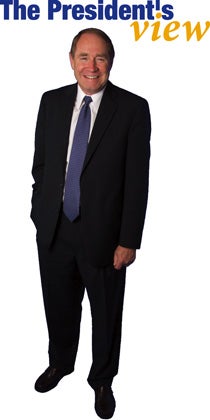The second year
 My first year as president of the University of Rhode Island is in the books. It was certainly an eventful year for Lynn and me. There were many enjoyable and rewarding moments throughout the year—and many of these involved alumni of URI. The year came with its challenges and difficult moments as well; fortunately, these were far fewer. Over the course of the year, I was asked on multiple occasions what I found to be “surprising” about the University or the state. My consistent answer went something like this: Thanks to the candor and thoroughness of the search process and practically everyone I met initially, nothing about the qualities, opportunities, and challenges facing the University of Rhode Island or the state were really a surprise. What I did find somewhat surprising were a couple of attributes shared among many Rhode Islanders. First, was the spirit of pessimism that, from my perspective, was remarkably pervasive given all the very positive qualities and advantages that I felt (and still feel) were so evident in the University and the state. Second, and perhaps related, was what appears to be a surprising lack of understanding and appreciation of the University of Rhode Island by many folks across the state. The connection between these two observations (if they are, in fact, accurate) may be that if people here truly understood the high quality and the enormous capabilities of the University of Rhode Island, they might be more confident that the problems and issues facing our state can be overcome.
My first year as president of the University of Rhode Island is in the books. It was certainly an eventful year for Lynn and me. There were many enjoyable and rewarding moments throughout the year—and many of these involved alumni of URI. The year came with its challenges and difficult moments as well; fortunately, these were far fewer. Over the course of the year, I was asked on multiple occasions what I found to be “surprising” about the University or the state. My consistent answer went something like this: Thanks to the candor and thoroughness of the search process and practically everyone I met initially, nothing about the qualities, opportunities, and challenges facing the University of Rhode Island or the state were really a surprise. What I did find somewhat surprising were a couple of attributes shared among many Rhode Islanders. First, was the spirit of pessimism that, from my perspective, was remarkably pervasive given all the very positive qualities and advantages that I felt (and still feel) were so evident in the University and the state. Second, and perhaps related, was what appears to be a surprising lack of understanding and appreciation of the University of Rhode Island by many folks across the state. The connection between these two observations (if they are, in fact, accurate) may be that if people here truly understood the high quality and the enormous capabilities of the University of Rhode Island, they might be more confident that the problems and issues facing our state can be overcome.
There is no doubt that Rhode Island, like most of the nation, today finds itself sitting in a deep hole. It’s a hole dug in part by Rhode Islanders themselves, with a lot of assistance from the national economic recession. It is a recession that, regrettably, appears far from over. There is a growing consensus that job creation must be the primary strategy to end the downturn. A substantial challenge for Rhode Island is the probability that the jobs of the future will require more education at the college level than the jobs of the past. Our college participation and completion rates in Rhode Island lag behind much of the rest of the nation and many other countries. Further, the percentage of our current workforce that has successfully completed significant college-level work is relatively low. URI can be a critical and essential contributor to overcoming these challenges.
How? We can substantially expand our Web-based, distance learning efforts; grow research and technology transfer and student participation in these activities; partner with other higher education institutions to efficiently deliver new programs; work with K-12 to improve college preparation; collaborate with businesses and organizations to create more internships and “hands-on” learning opportunities; emphasize the importance of developing community and unity that respects and embraces the increasing diversity of our state and nation; and internationalize our campus so that our graduates are globally competitive. This will require resources—new investment. True, Rhode Island is at the bottom of a pretty deep hole. But we have the tools to climb out. We can use the hammer, nails, and lumber at hand to build a box on which to sit more comfortably at the bottom of our hole, or we can build a ladder. Higher education is that ladder. It is our collective choice to decide that we need to build it tall enough to climb out. Working on this will be a major focus of my second year. Your help will be essential.
—David M. Dooley

P.S. And your help is essential to help pass Question 2 on the ballot on Nov. 2. Please vote Yes on the bond issue for higher education that includes a new Center for Chemical and Forensic Sciences at URI to replace the antiquated Pastore Hall.
 Home
Home Browse
Browse Close
Close Events
Events Maps
Maps Email
Email Brightspace
Brightspace eCampus
eCampus


